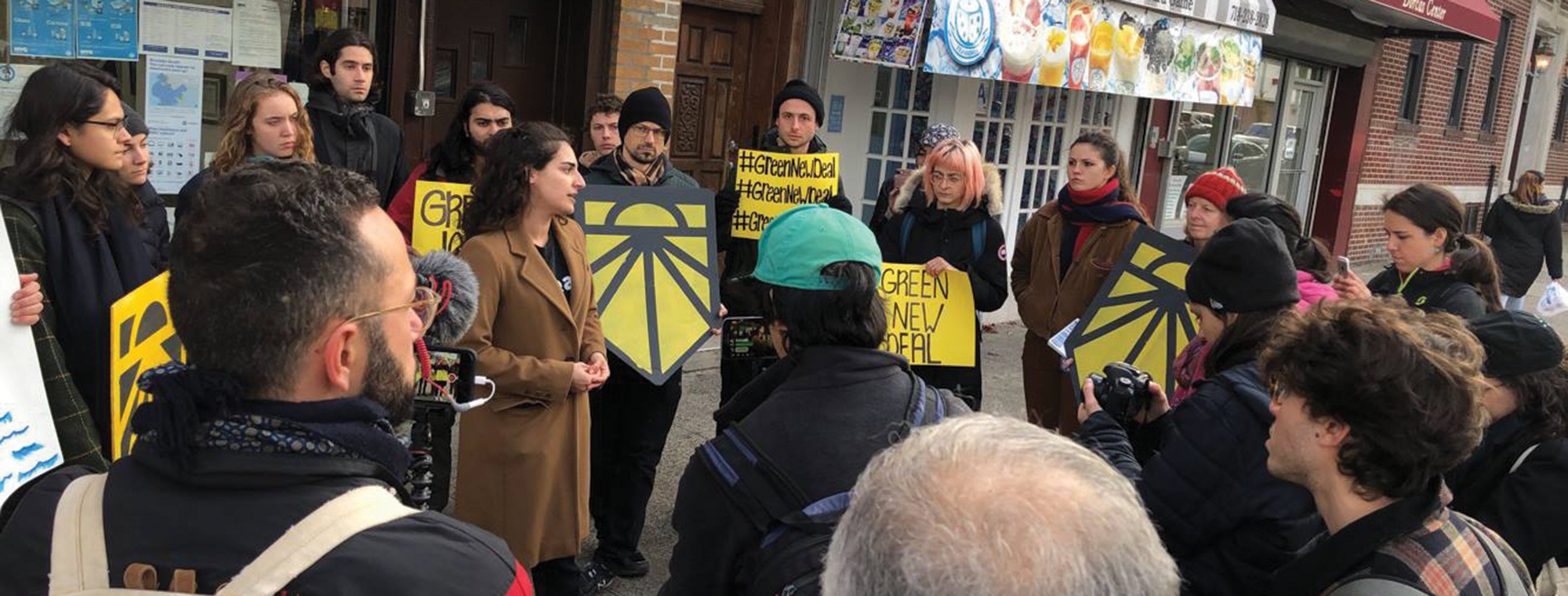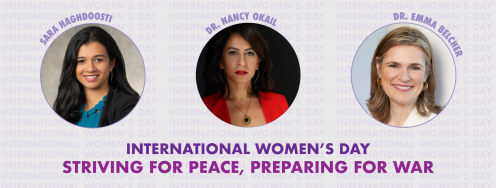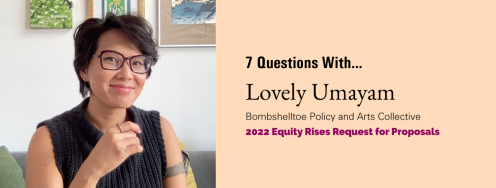By Cecili Thompson Williams
At its core, ours is an existential fight. Our work to prevent nuclear war is driven by an understanding that humanity has the capacity to destroy itself and we can’t leave prevention to chance.
The Doomsday Clock is currently set at two minutes to midnight — the closest to a nuclear apocalypse it has been since the height of the Cold War.1 Several factors have put us so close to midnight. These include: misinformation campaigns on social media, increasing risk of cyber-based conflicts and the threat of climate change. But most threatening of all are unpredictable nuclear-armed world leaders like Donald Trump, Vladimir Putin and Kim Jong-un.
At Beyond the Bomb, our primary focus through 2021 is passing domestic “No First Use” (NFU) legislation — a sensible policy in which a nuclear armed state pledges not to use nuclear weapons unless first attacked with nuclear weapons. It would legally prohibit the president from single-handedly launching a nuclear weapon on a baseless whim. NFU is a critical and achievable step to reducing the risk of nuclear war — by limiting the possibility of an accidental or ill-intentioned US first strike. It is not the final step in preventing nuclear war, but it is a solid first step required to lower our current risk and put us on a path to launch a renewed disarmament effort.
But we can’t solve this existential crisis within the same social frameworks in which it was created. Our work must incorporate significantly broader audiences than it has in the past and engage them in meaningful and respectful ways. Thus, we view our work as deeply relevant to many other fights for positive social and environmental change because we view them through the lens of our shared values. If a nuclear weapon was detonated anywhere in the world, it would likely decimate our ability to carry out effective work on any other issue. The rights and freedoms that we leverage to fight for positive change would be limited, if not eliminated entirely.
With this knowledge, we are expanding our work to acknowledge the fundamental role that intersectionality plays in nuclear policy. At the end of the day, if our work isn’t appealing to a wide variety of audiences, we are undermining our potential for success. So many of the major fights of our time — from social justice to the environment — present opportunities to implement common sense nuclear policies through new platforms and to new audiences. This includes building a sustainable, environmentally-friendly economy.
Researchers have found that even a relatively small-scale and localized nuclear war, for example between India and Pakistan, would have global climate impacts. Atmospheric soot would block sunlight and further deplete the ozone layer, lower global temperatures, ruin global agricultural yields and cause catastrophic economic downturns.2 In sum, building a sustainable and environmentally-friendly economy would be critically undermined by the use of any nuclear weapon. The Green New Deal (GND), which links the economic movement with the environmental movement, offers a unique vehicle for advocating for commonsense nuclear policy including NFU with a diverse audience of lawmakers and voters. Most recently, our partnership with the Sunrise Movement, the primary group organizing on this issue, presented us with an excellent opportunity to do just that.3
The Green New Deal and No First Use
The GND calls for the establishment of a House Select Committee on a Green New Deal, which would be charged with developing a national industrial and economic climate plan to address the negative effects of climate change. Specifically, the GND looks to build policy solutions within four pillars: an economic bill of rights, a green transition, real financial reform and a functioning democracy. Within the context of the GND policy platform, the strategic rationale for incorporating nuclear policy may seem unclear. However, the fourth pillar of the GND — “a functioning democracy” — includes a clause about reining in the military-industrial complex. A core principle of democratic governance — checks and balances on power — is currently not present in the decisionmaking process to carry out a nuclear strike. NFU supports a functioning democracy by limiting the president’s sole authority to carry out a planet-altering nuclear strike and prevents the president from launching nuclear weapons except in the case of an incoming strike. By adopting an NFU policy, Congress can create an important barrier against the indiscriminate and undemocratic use of nuclear weapons.
When discussing the military-industrial complex, the GND specifically calls for creating a new round of nuclear disarmament initiatives. NFU not only drastically reduces the threat of an accidental or unfounded nuclear first strike, it holds broader policy implications for disarmament and preventing nuclear war fighting. For example, an NFU policy would mean there is no need to retain first strike weapons, and thus we could take nuclear weapons off hair-trigger alert and phase out land-based ballistic missiles.
Further still, to reign in the military-industrial complex we must re-evaluate our spending and review our understanding of what constitutes national security. The exorbitant amount of money we spend on our outdated and dangerous nuclear system, if instead put toward our crumbling infrastructure, painfully underresourced schools or green jobs would make us more secure. All such examples are core policies for the sustainable economic goals of the GND. Therefore, the incorporation of NFU in the GND is essential and should be the central policy pathway to fulfilling its fourth prong. It is on these principles that we are building our partnership with the leaders of the GND and exposing the connection between nuclear policy and climate change.
This partnership arose through our work to engage 2018 candidates for Congress in support of an NFU policy. We asked candidates to commit to support NFU once they were elected. Specifically, in January 2019 Representative Adam Smith (D-WA) and Senator Elizabeth Warren (D-MA) introduced legislation that would make NFU the official policy of the United States.4 Support is growing in Congress and increasingly notable members are endorsing the policy. In a November 2018 speech Senator Warren said, “To reduce the chances of a miscalculation or an accident, and to maintain our moral and diplomatic leadership in the world, we must be clear that deterrence is the sole purpose of our arsenal.”5
The beauty of the intersection between NFU and the GND is that it truly captures what the future of policy looks like — efforts that recognize the interconnected nature of policy implications and aim to address system challenges with bold new solutions. Being able to so clearly address the threat of nuclear war while also working to reverse climate change and moving toward a thriving, green economy is a win-win-win for Americans and the global community. In immediate terms, we need lawmakers who understand both the unique moment we are in and the unprecedented potential of this kind of bold legislation to vocally support the GND and commit to incorporating NFU as a central component. To demonstrate this support, all members of Congress should co-sponsor Senator Warren and Representative Smith’s NFU bill and lay a clear policy foundation for this commonsense policy.
Building a Movement for No First Use Through Authentic Partnerships
The more candidates with whom we spoke in 2018, the more evidence we saw of our deep philosophical alignment with many of the GND’s policy recommendations and champions. Candidates and voters alike were concerned about the threat to national security posed by both our nuclear system and climate change. Further, the American people were alarmed that our government seems incapable of taking bold action on either issue. There is a clear need to understand nuclear issues among voters, candidates, elected officials and activists alike. NFU gives people a simple, tangible and meaningful avenue to effect change in nuclear policy.
To achieve the level of support we have received for NFU today, we needed a large presence on-the-ground in districts. And we could not have done so without identifying and engaging other movements that share a values-base and for which our issue is relevant, and subsequently engaging their activist networks. But to gain their support for NFU, we had to first plug into current events outside of the nuclear policy space and understand the fundamental values at the core of their work.
We recognize the positive contributions that everyone can make in breaking through the status quo in nuclear policy to build a truly multi-issue movement for change. We look for partners who share our values — justice, community, equity and leadership — and for whom we can provide genuine support in return. This approach — values-based campaigning and building authentic partnerships — means making a commitment to long-term relationship-building, providing strategic support, showing up and mobilizing on behalf of others’ work. Through it we are able to identify partners outside of the nuclear space with which we can collaborate. As we have seen from the swell in support for an NFU policy, these relationships lead to significantly broader grassroots and grasstops engagement opportunities as we grow and nurture them. Our partnership with the Sunrise Movement and the GND is just one example of success in authenticity and allyship.
Authentic partnerships are not merely a strategic decision, they are how we put our values into action. Every player engaged in change work — nongovernmental organizations, policymakers, activists and beyond — should aim to build authentic partnerships into their work. This is done by cross-checking participation in meetings, regularly brainstorming ways to include new partners and looking for the broader relevance of their work.
A final point: the nuclear topic has historically been reserved to closed door conversations by those in power (read: white men). But, it is increasingly finding innovative leadership and participation from women and people of color. The voices driving the campaign strategies are seemingly more diverse by the week — with women and people of color taking on more leadership roles throughout the nuclear space. This is an aspect of the work that has gained great recognition as of late, bringing a new era of opportunity for these traditionally marginalized voices.
The drive toward diversity, equity and inclusion that underpins the current civic moment around women’s inclusion and #MeToo should expand to acknowledge and orient around the fundamental role that intersectionality plays in this fight — along gender lines, yes, but also race, ethnicity, religion, socio-economic status, health and more. It is in this vein that support for intersectional policy solutions, like linking NFU and the GND, has deeper value and long-term implications.
Conclusion
We are working to prevent nuclear war to safeguard a future where other fights for social and environmental justice can be met with success. But we cannot do it alone. As we open up to deeper, more collaborative relationships with those who were once thought to be unlikely partners, we must do so authentically. Looking to the future, we see the Sunrise Movement (and others who share our same values) figuring prominently in our strategies to prevent nuclear war. This will have a positive impact on the overall disposition of the nuclear policy space — moving us toward greater partnership, collaboration and recognition of the value of diverse voices — and especially on passing NFU.
We are proud to work with Senator Warren, Representative Smith and other congressional champions to move NFU into law. But we also know that broader recognition of this policy will result in faster passage and sounder implementation. Thus, we are asking all policymakers to join us in recognizing opportunities to enhance other legislative packages, such as the GND, by incorporating NFU into its fourth pillar and offering support. Because ultimately our work to prevent nuclear war is not solely about preventing the direct devastation that it would bring, but about protecting our ability to continue to bend the arc of the universe toward justice.
Cecili Thompson Williams is the director of Beyond the Bomb where she leads a team of campaigners and activists mobilizing against the threat of nuclear war and weapons. She has nearly two decades of experience leading mission-driven campaigns with organizations including Amnesty International USA, RESULTS Educational Fund and the National Partnership for Women & Families. Previously, she founded and served as the chief strategist for We Divine Water, a consulting group helping smart and passionate changemakers build strategic and effective campaigns. She also serves as a faculty member at the Center for Social Design at the Maryland Institute College of Art.
This article is part of our new report, "A New Vision: Gender. Justice. National Security." See all the articles from our report here.
Make #NoFirstUse part of the #GreenNewDeal for the #environment #NewVision2019.
Notes
1 “Doomsday Clock,” Bulletin of the Atomic Scientists, accessed January 14, 2019, https://thebulletin.org/doomsday-clock.
2 James MacDonald. “The Environmental Impact of Nuclear War,” JSTOR Daily, (JSTOR, August 26, 2017), https://daily.jstor.org/the-environmental-impact-of-nuclear-war.
3 “Our Road to Victory on a Green New Deal,” Sunrise Movement, accessed January 14, 2019, https://www.sunrisemovement.org/gnd-strategy.
4 US Congress, House, To establish the policy of the United States regarding the no-first-use of nuclear weapons, H.R.921, 116th Congress, introduced in House January 30, 2019, https://www.congress.gov/bill/116th-congress/house-bill/921.
5 Nahal Toosi. “’A moment of crisis’: Warren lays out foreign policy vision,” Politico, Nov. 29, 2018, https://www.politico.com/story/2018/11/29/elizabeth-warren-foreign-policy-1029102.
Photo: Organizing event with the Sunrise Movement in support of the Green New Deal. Photo credit: Beyond the Bomb




